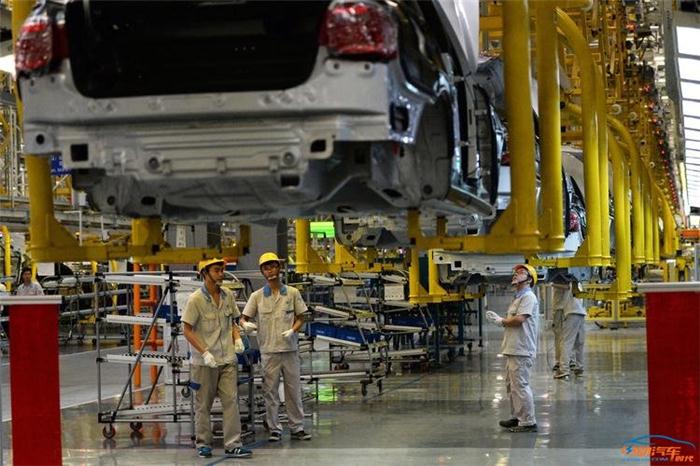On Tuesday, a number of automakers confirmed that China ordered the suspension of more than 500 vehicles that did not meet fuel consumption standards. This is the latest measure taken by Beijing to reduce pollution emissions and take the lead in responding to climate change in the world’s largest auto market. The official Chinese news agency Xinhua News Agency said in a report on Sunday that the suspension of production orders from January 1st will affect domestic automakers, FAW-Volkswagen and Beijing Benz. enterprise. The report did not give the termination time of the production stop order. This action is expected to affect a small part of the Chinese automobile manufacturing industry. In 2016, China produced 28 million cars. There are more than a dozen small-scale automakers in China—some of which only survive hundreds of cars a year—and the central government has tried to expand its auto industry. This may be a factor contributing to this shutdown. Experts said that even so, this measure shows that China is willing to try a strong anti-pollution approach and hopes to play a leading role in combating climate change. For many years, China has always placed economic development ahead of environmental protection. Today, more than a quarter of the world's total greenhouse gases have been emitted. After President Trump decided to withdraw from the Paris climate agreement, China became an important bastion to deal with climate change. In dealing with dangerous air pollution, Chinese leaders are facing tremendous pressure: Air pollution has become a hot topic in the country. Severe haze has forced schools and enterprises to temporarily shut down. At the end of December 2017, China stated that it will promote plans to build the world's largest carbon market. It will provide domestic power companies with financial incentives to make them operate in a cleaner manner. Dunne Automotive is a Hong Kong-based consulting company focused on the clean energy automotive market in China. The company’s president, Michael Dunne, said: “They are sending a signal to everyone: Now that the government is coming, it shows that the government’s emission standards are deterrent.†Assembly line in FAW-Volkswagen factory in Chengdu, China. In 2016, China produced 28 million cars. Image Credit: Goh Chai Hin/Agence France-Presse — Getty Images The Chinese government has become the world’s largest supporter of electric vehicles, providing a large number of incentives for manufacturers that produce so-called “new energy vehiclesâ€. According to the plan, these incentives will be gradually reduced by 2020, replaced by car manufacturers must sell clean energy car quotas - which will prompt the global car manufacturers accelerated transformation, instead of producing electric cars. In contrast, the United States is considering relaxing tailpipe emission standards. In the recent reform of the tax law, the government almost canceled tax breaks for electric cars. Bruce M. Belzowski, director of the Automotive Futures group at the Transportation Research Institute at the University of Michigan, believes that Dongfeng Motor Group and other Chinese state-owned auto makers are in this action. China has not been spared. "This shows that the Chinese government has not favored any party in order to achieve its goal." For a long time in the past, the Chinese government has not implemented a particularly stringent emission standard, in order to allow local automakers to catch up with the latest clean-energy vehicle technology. However, the situation has changed. The government has set stricter emission regulations. "The recent changes have proved how quickly domestic automakers have developed," said Dunn. "They seem to be saying: We are ready to play this game!" Foreign automakers are also assessing the impact of the shutdown order that began on Tuesday. Volkswagen, General Motors, Honda and other foreign manufacturers in China were asked how many cars their Asian companies specifically affected. BMW's Rebecca Kiehne said the company is not yet ready to comment. BMW operates a Sino-foreign joint venture BMW Brilliance in China. Han Tjan, a spokesman for Daimler, said that the production of Beijing Benz (which is a joint venture between the company and Beijing Automotive Group) will not be affected. He said that the only model involved in this suspension was the high-end E-class vehicle, and the company will no longer produce this model after 2016. Michelle Krebs, an analyst at the AutoTrader Group, said that regardless of the outcome, global automakers have to comply with China's increasingly stringent policies. She said: "China is the largest automotive market. This simple fact means that manufacturers can only adapt."
The XCMG hydraulic cylinder repair kit is mainly used in the hydraulic systems of engineering machinery such as XCMG excavators and loaders, for repairing the seals of hydraulic cylinders.
For Xcmg Cylinder Seal Kit,For Xcmg Hydraulic Pump Seal Kit,Xcmg Travel Motor Seal Kit,Travel Motor Seal Kit For Xcmg Safe Seal Technology Co., Ltd. , https://www.jsspreals.com
![]()
Hydraulic cylinders are an important component of the hydraulic system of construction machinery, used to convert hydraulic energy into mechanical energy,
Convert the pressure of hydraulic oil into linear or rotational motion to drive various working components of construction machinery. The sealing components of hydraulic cylinders are key components to ensure their normal operation. If the sealing components are damaged or aged, it can lead to hydraulic oil leakage, hydraulic cylinder failure, and other problems, affecting the normal operation of construction machinery.
Therefore, the application of XCMG hydraulic cylinder repair kit can effectively solve the sealing problem of hydraulic cylinders,
Extend the service life of hydraulic cylinders and improve the efficiency of construction machinery.